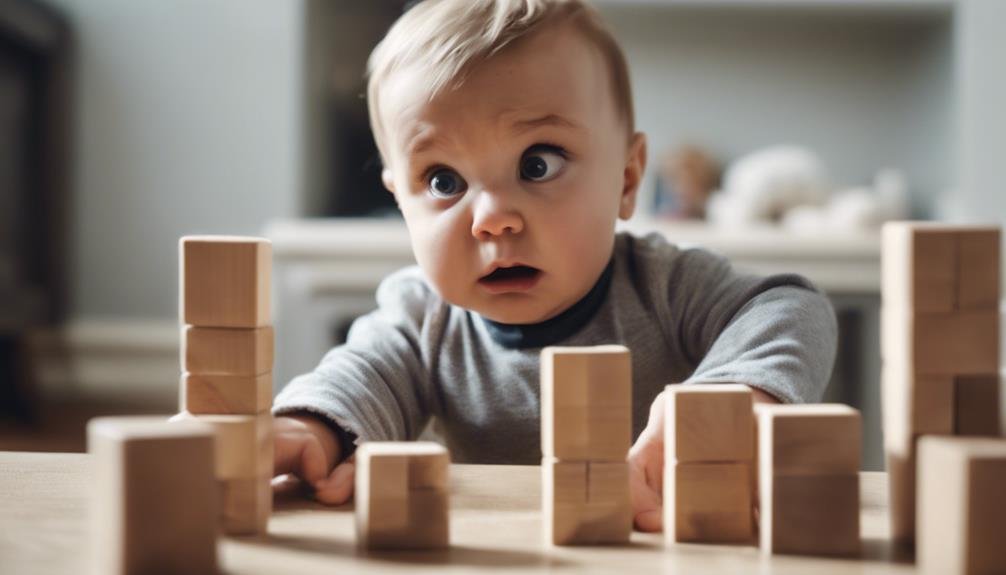Early Signs of Developmental Delays in Toddlers: What Parents Should Know
As a parent, navigating the developmental journey of your toddler is akin to embarking on a voyage into uncharted waters. There are subtle cues and signals that can steer you towards potential developmental delays in your little one. Understanding these early signs can arm you with the knowledge needed to guide your child towards reaching their milestones effectively. By being attuned to these indicators, you hold the compass to navigate through the complexities of your child's growth and ensure a smoother voyage ahead.
Key Takeaways
- Watch for delays in speech, motor skills, social interactions, and cognitive abilities.
- Seek guidance if red flags are noticed in your child's development.
- Timely intervention is crucial for addressing developmental delays.
- Monitor social, emotional, language, motor, and cognitive milestones.
- Observing how your child interacts and engages with their environment is essential.
Importance of Early Detection

Early detection of developmental delays in toddlers is crucial for timely intervention and support. As a parent, you play a vital role in observing your child's development and recognizing any potential delays. Keep an eye out for signs such as delays in speech and language, motor skills, social interactions, and cognitive abilities. If you notice any red flags or have concerns about your child's development, don't hesitate to seek guidance from healthcare professionals.
Social and Emotional Milestones
Observing your toddler's social and emotional milestones is key to understanding their development and well-being. As a parent, you play a crucial role in nurturing these aspects of your child's growth. By paying attention to how your toddler interacts with others and expresses their emotions, you can gain valuable insights into their overall development.
Social milestones involve how your child engages with peers, family members, and other individuals. At around this age, toddlers typically begin to show interest in playing with other children, sharing toys, and demonstrating basic empathy. They may also start to exhibit a wider range of emotions and learn to manage them in different situations.
Emotional milestones are equally important, as they reflect your toddler's ability to understand and regulate their feelings. By observing how your child responds to different emotions, copes with frustration, and seeks comfort when upset, you can gain a better understanding of their emotional well-being. Remember, each child develops at their own pace, so it's essential to be patient and supportive as they navigate these social and emotional milestones.
Language and Communication Skills

To support your toddler's development, it's essential to nurture their language and communication skills from an early age. Language plays a crucial role in your child's overall growth and can be an early indicator of developmental delays. Encouraging your toddler to communicate through words, gestures, and expressions fosters their ability to express thoughts and emotions effectively.
Pay attention to your child's language development milestones. By the age of 12-18 months, most toddlers should start saying simple words like 'mama' or 'dada.' Between 18-24 months, they typically begin combining words to form short phrases. If you notice delays in these milestones or your child struggles to communicate, consider consulting a healthcare provider for guidance.
Engage in activities that promote language skills, such as reading books, singing songs, and having conversations with your toddler. Creating a language-rich environment can significantly enhance their communication abilities and overall development. Remember, each child develops at their own pace, but it's important to address any concerns early to support their language growth effectively.
Motor Development and Coordination
If you notice your toddler having difficulties with tasks like crawling, walking, or using utensils, it may be a sign of delays in their motor development and coordination. It's essential to pay attention to these signs as early intervention can make a significant difference in your child's development. Here are some common motor development milestones for toddlers:
| Motor Skills Milestones | Description |
|---|---|
| Crawling | Babies typically start crawling between 6-10 months of age. |
| Walking | Most toddlers take their first independent steps around 12-15 months old. |
| Using Utensils | By 18-24 months, toddlers should begin using utensils to feed themselves. |
If your toddler is struggling to achieve these milestones, consulting with a healthcare provider or a developmental specialist can help determine if there are any developmental delays that need to be addressed. Remember, every child develops at their own pace, but being aware of potential delays and seeking guidance early can support your child's overall development.
Cognitive Abilities and Problem-Solving

Detecting signs of developmental delays in toddlers requires careful observation of their cognitive abilities and problem-solving skills, which play a crucial role in their overall growth and learning. As a parent, you play a vital role in recognizing how your child interacts with their environment, processes information, and solves problems. Typical cognitive development in toddlers involves curiosity, exploration, and the ability to imitate actions and solve simple puzzles.
You may notice red flags if your toddler struggles to follow simple instructions, has difficulty remembering familiar objects or people, or shows limited interest in exploring new environments. Additionally, delays in problem-solving skills may manifest as challenges in stacking blocks, sorting shapes, or completing simple tasks that require multiple steps.
It's important to remember that each child develops at their own pace, but being attuned to potential delays can help in seeking early interventions if needed. By fostering your toddler's cognitive abilities through play, exploration, and engaging activities, you can support their overall development and lay a strong foundation for future learning.
Red Flags for Developmental Delays
Recognizing potential red flags for developmental delays in toddlers can empower you to seek appropriate support and interventions for your child's growth and well-being. It's crucial to be aware of signs that may indicate your toddler could benefit from further evaluation or assistance. Here are some red flags to watch for:
- Speech and Language Delays: Difficulty with speaking, understanding, or forming words appropriately for their age.
- Motor Skill Delays: Challenges with crawling, walking, running, jumping, or using fine motor skills like holding a spoon.
- Social and Emotional Delays: Struggles with interacting with others, showing emotions, or making eye contact.
- Cognitive Delays: Issues with problem-solving, memory, attention span, or understanding basic concepts.
If you notice any of these red flags persisting or becoming more pronounced over time, it's advisable to consult with a healthcare provider or developmental specialist. Early identification and intervention can make a significant difference in supporting your toddler's development and overall well-being.
Frequently Asked Questions
Can Siblings Have an Impact on a Toddler's Developmental Delays?
Siblings can influence a toddler's development, but they don't directly cause delays. As a parent, you can encourage positive interactions and seek professional guidance if you notice any concerns about your child's development.
How Do Different Parenting Styles Influence Developmental Milestones?
Different parenting styles impact developmental milestones differently. For example, authoritative parenting, characterized by warmth and structure, often fosters better outcomes. Remember, your parenting approach plays a crucial role in shaping your child's development.
What Role Does Nutrition Play in a Child's Cognitive Abilities?
Eating nutritious foods supports your child's brain development, enhancing cognitive abilities like memory and focus. Incorporate a variety of fruits, vegetables, whole grains, and proteins into their diet to optimize their learning potential.
Are There Cultural Factors That Affect Early Detection of Delays?
Cultural factors can impact early detection of delays in children. Your traditions, beliefs, and language may influence how you perceive development. Be open to diverse perspectives, seek support, and trust your instincts in recognizing any potential delays in your child's growth.
Can Screen Time Impact a Toddler's Motor Development?
Spending excessive time on screens can impact your toddler's motor development negatively. Encourage physical play and movement to support healthy growth. Limit screen time and prioritize activities that promote physical development for your child's well-being.
Conclusion
You have the power to be your child's superhero!
By staying alert to the early signs of developmental delays, you can swoop in and save the day with early intervention.
Remember, you're the key to unlocking your child's full potential and ensuring their future success.
Keep an eye out for those red flags and take action – you're the ultimate protector of your little one's growth and well-being!




